Northern Ireland Secretary: I won’t ‘impose’ same-sex marriage
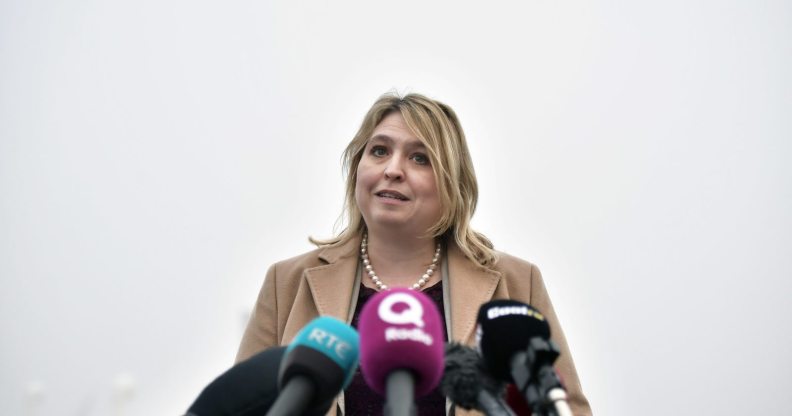
(Getty)
The Secretary of State for Northern Ireland has said that she will not impose same-sex marriage on the region – which is the only part of the UK without marriage equality.
Northern Ireland is the only part of the UK that still bans same-sex couples from marrying, and has been without a government since January 2017, due to the failure of power-sharing talks between Sinn Fein and the DUP, who legally must form an executive as the two largest parties.
With no power-sharing deal in sight, LGBT campaigners in the region have urged the British government to intervene to ensure that gay couples have equality.
But the UK government’s new Northern Ireland Secretary slapped down the calls this week on a trip to Belfast.
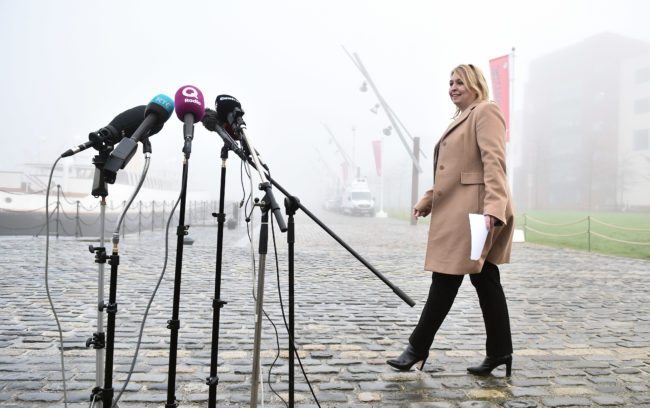
The new Northern Ireland Secretary of State Karen Bradley (Photo by Charles McQuillan/Getty Images)
Speaking to the press, Secretary of State for Northern Ireland Karen Bradley insisted that introducing marriage equality was a job for a future Northern Ireland Assembly.
According to the Belfast Telegraph, she said: “I am a supporter of same-sex marriage, I voted for it, but that is a matter for the people of Northern Ireland and that’s a decision that needs to be taken by the people elected by the people of Northern Ireland.
“I am not here to impose any of those things, I am here to help facilitate a government of the people of Northern Ireland, the representatives of the people of Northern Ireland delivering for the people of Northern Ireland.”
Explainer: Why doesn’t Northern Ireland have equal marriage yet?
If no action is taken it is likely gay couples will have to wait many more years for the right to marry in the region.
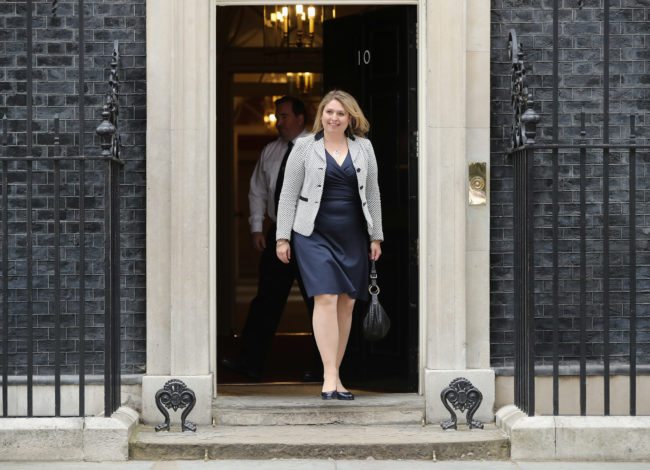
Karen Bradley leaves 10 Downing Street (Photo by Dan Kitwood/Getty Images)
Sinn Fein have demanded a settlement on equal marriage as part of any power-sharing deal, while hardliners in the DUP have threatened to revolt if the party makes any concession on the issue.
In the previous assembly, the DUP used a procedure known as a ‘petition of concern’ to override democratic votes in favour of equal marriage.
Michelle O’Neill, Sinn Fein’s leader in Northern Ireland, recently warned that gay people could not be treated as “second-class citizens”.
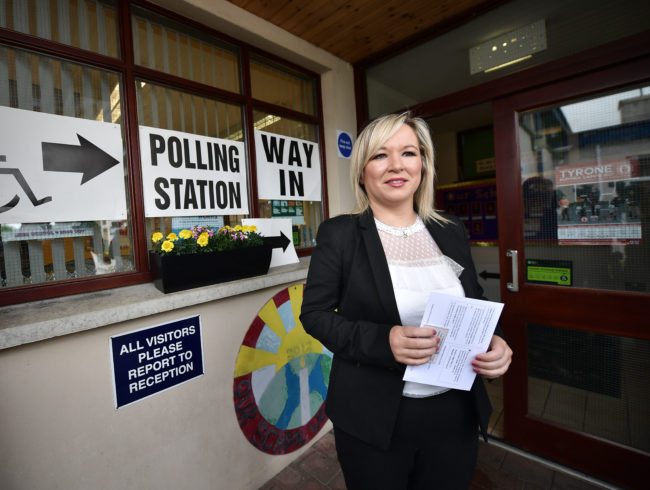
Sinn Fein northern leader Michelle O’Neill (Photo by Charles McQuillan/Getty Images)
In a New Year’s address, she said: “The past 12 months has been an extraordinary time politically.
“We have witnessed incredible political developments, suffered the loss of a political giant but also the reawakening of the demand for fairness and equality at the heart of our political process.
“And as we look forward to 2018, Sinn Féin is determined and optimistic that we will realise that demand.”
She added: “I am optimistic because I see the transformation that has taken place in this society since the people voted for the Good Friday Agreement 20 years ago.
“I see the young people who will not tolerate their peers being treated as second-class citizens because of their sexuality.
“I see civic society standing up to be counted and demanding their rights and entitlements are protected and enshrined on the same basis as they are elsewhere on these islands.
“They will not accept the denial of language rights, of marriage equality and the right to coroner’s inquests because the DUP dictate it.
“People across Ireland have been shaken by the recklessness of the DUP-Tory Brexit agenda and the immense harm it will cause to communities and the economy throughout the island.
“That is not the future they want for their children and grandchildren.”
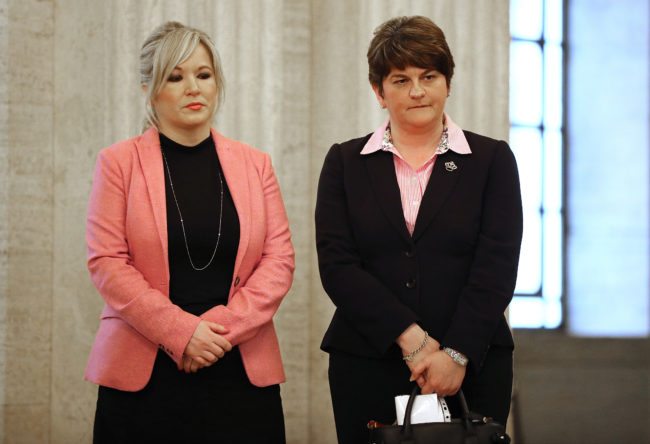
Sinn Fein leader Michelle O’Neill (L) and (DUP) Democratic Union Party Leader Arlene Foster (Photo by Dan Kitwood/Getty Images)
She added: “Fifty years on from the Civil Rights campaign in 1968, the North is a very different place. A place where the denial of rights, equality and respect will no longer be accepted.
“A majority want the restoration of genuine power sharing.
“A majority want rights and equality.
“A majority reject the frustration of their achievement; the erection of a barrier to this by a minority who have a different political opinion or religious belief.”
Of a potential deal to restore power-sharing, she said: “I believe that can happen early in the New Year but only if the institutions represent genuine and equal partnership Government for all our people.
“That will require the British government and the DUP accepting the political and democratic reality which has already been made abundantly clear by the electorate.”
LGBT activists in the region have previously called for the UK government to directly intervene to secure equal marriage due to the collapse of power-sharing.
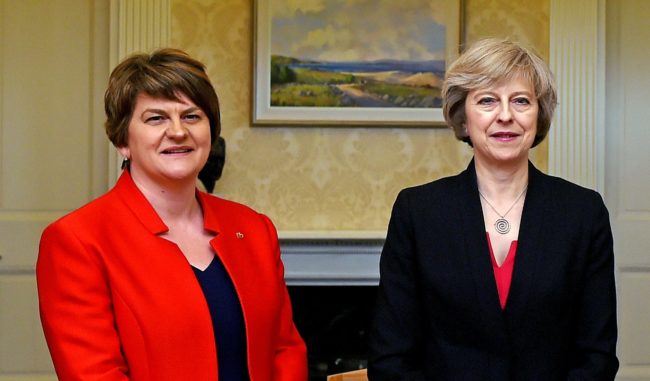
Arlene Foster with British Prime Minister, Theresa May
Director of The Rainbow Project John O’Doherty said: “Of course, we would prefer that the Northern Ireland Assembly were in a position to grant these rights; the Assembly is not currently functioning.
“It is, therefore, the responsibility of Theresa May’s government to make the necessary amendments to the marriage legislation to make it applicable in Northern Ireland.
“The eyes of LGBT people around the world will now be on Theresa May. She says that she has changed her mind on LGBT equality over her years in Parliament. Now is her chance to prove it.”
Clare Moore of Love Equality concurred: “During this period of political instability it is now imperative that the Westminster government takes immediate action to ensure that the rights of LGBT people in United Kingdom are available for all UK citizens.”
Such a move would likely be opposed by both the DUP, who oppose equality, and Sinn Fein, who oppose UK interventions in Northern Ireland.
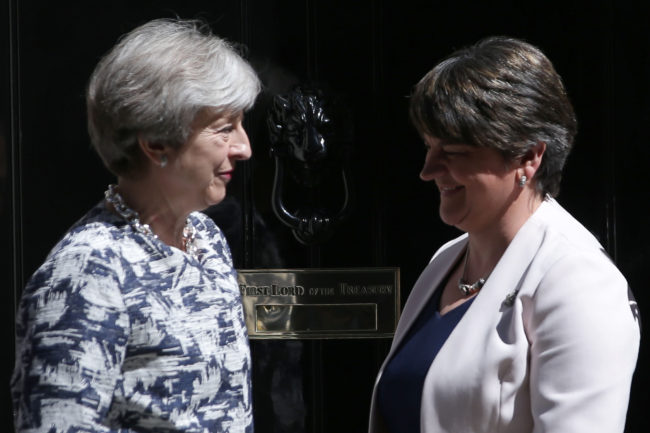
Theresa May and Arlene Foster (Getty)
However, there were hints last month that the UK Labour Party may support proposals to break the impasse.
According to The Times, Jeremy Corbyn’s Shadow Northern Ireland Secretary Owen Smith is in favour putting equal marriage and abortion rights to a referendum if power-sharing is not restored.
Polling suggests that there is overwhelming support for same-sex marriage in the region, and when a referendum was held in the Republican of Ireland in 2015, 62% backed the change.
A referendum could be a way to allow equal marriage in Northern Ireland to go ahead with popular support, despite the lack of power-sharing.
UK Prime Minister Theresa May recently expressed her personal support for same-sex marriage, in an exclusive column for PinkNews.
Writing for PinkNews, Mrs May affirmed: “I want all British citizens to enjoy the fullest freedoms and protections. That includes equal marriage – because marriage should be for everyone, regardless of their sexuality.
“And while that is a matter for the devolved government of Northern Ireland, I will continue to make my position clear – that LGBT+ people in Northern Ireland should have the same rights as people across the rest of the UK.”

